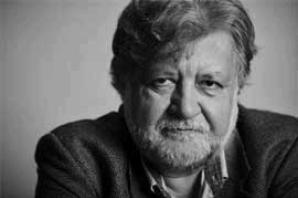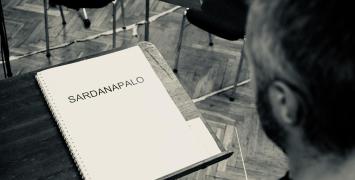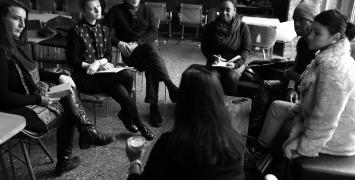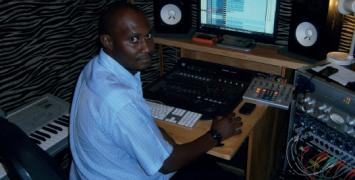The jazz of physics
Three-time ERC grantee and four-time panel member in the ERC evaluations (the last three as panel chair), Maciej Lewenstein is not only one of the key physicists of the 21st century, but also a jazz expert. In this interview, he talks about his passion for free-improvised music and explains the intrinsic connections between quantum physics and jazz.

What do you like about jazz? When and why did you start liking it?
What I like about jazz is the freedom of improvisation and the unpredictability of it. I started listening to it when I was a very small boy in communist Poland. During the Stalin era, jazz was forbidden in Poland and therefore played underground. I was born in 1955, when jazz started to emerge from the underground and there was an explosion of interest in it.
Jazz was always considered as a political demonstration against communists and against any kind of suppression of freedom. In 1967, my father took me to a concert in the National Philharmonic in Warsaw: it was a quartet with Charles Lloyd on saxophone and Keith Jarrett on piano. So I was indoctrinated by my father who considered things which were anti-communist to be good. Later on, I started to collect records. Now, my collection is about 9 000 CDs and maybe 1 000 LPs. I keep enlarging my collection of jazz LPs, but even as a professor of theoretical physics, I don’t have enough money to buy LPs. And this is how I became sort of a professional jazz critic.
Are you also transmitting your passion to your children?
Yes, but now I am regressing, in the sense that the music that I like the most is free-improvised music. So, it's completely random. Maybe I like it because of its connection to physics but it's a little crazy. So most of the time my children don't like it, except for one of my three sons – he is trying to follow a music career. He wants to study mathematics and music and tolerates this kind of music.
I was always fascinated by the relation of the unpredictability of quantum mechanics and the unpredictability of a free improviser playing an instrument
How is jazz related to quantum physics?
Recently, I realised that there are two immediate connections to physics: randomness and unpredictability. These properties are intrinsic to quantum physics.
Randomness expresses itself in the ‘non-locality’ principle [ability of objects to instantaneously know about each other's state, even when separated by large distances], which is one of my subjects of research. I was always fascinated by the relation of the unpredictability of quantum mechanics and the unpredictability of a free improviser playing an instrument. Even if free-improvised music is not completely unpredictable, it is interesting to know how predictable or how unpredictable it is.
Another fascinating connection is abstraction. Contemporary music is mostly based on abstraction from forms. If you consider classic jazz, all the developments are considered as going away from the structures, from banalities. If you think now about contemporary science, in order to describe a complex system, you also have to abstract from details, you have to go to the essence.
What do you do in your ERC-funded projects?
I mostly concentrate on quantum technologies and quantum simulators. With these systems, we try to mimic what the super high-temperature superconductors do and understand phenomena from other areas of physics or even from chemistry. That's the main subject also of my recently-funded ERC project, NOQIA, in which I connect some areas of physics that haven't been yet approached by this kind of idea of simulating one area through another.
The randomness of things in music could help people to understand scientific issues that otherwise would be very difficult to understand
Several times, you have organised or participated in events bringing together jazz and science. What motivated you to do so?
Well, obviously, there is a point of vanity. My colleagues are impressed by the fact that I know all the musicians and my musician friends are very interested in the fact that I'm a physicist and I know Noble Prize laureates. It’s funny. It's also a kind of pleasure. I have given colloquiums in serious institutions on this connection between abstraction in science and art. These are pleasant talks for the audience.
For the International Conference of Atomic Physics in 2018, I invited three of my free-improvising friends. It was a very risky experience but I told them ‘play something that prevents these 600 physicists who have no idea about free improvisation from going away from the gala dinner’. They did a fantastic job because they combined ‘prepared piano’ [an instrument mechanically altered to produce distorted sound] with playing tunes that have harmony. And we all survived!
Do you also play jazz?
Unfortunately, I’m not so talented. I’m very good listener, but I don't have too much time to practice.
Do you also like other forms of art and if so, why?
I do. I like all kinds of art, especially contemporary art. For me, art is not only something that helps me relax while I’m doing science but it is also a source of inspiration.
How do you see the interface between frontier science and art in general and why it is important to nurture it?
There are two aspects. One is the fact that the general public does not know too much about contemporary science. It can be popularised in the journals and the press, but usually this is read by a specific audience that is already interested in this kind of science. So there is definitely room for the kind of popularisation that makes use of the association between things like science and art, for instance. The second aspect is that there is a level at which some things are simply connected. The randomness of things in music could help people to understand scientific issues that otherwise would be very difficult to understand.
BIO
Maciej Lewenstein is a Polish theoretical scientist and a professor at the Catalan Institution for Research and Advanced Studies. He is currently working at the Institute of Photonic Sciences in Barcelona, where he leads a versatile group working on topics such as quantum optics, physics of matter and quantum information theory. He is an author of over 600 publications and six books: four on quantum physics and another two on jazz. He has received several major prizes, including the Alexander von Humboldt Research Prize (2007), the Prize of the Foundation for Polish Science (2011) and the Spanish Royal Physics Society Medal (2016).






